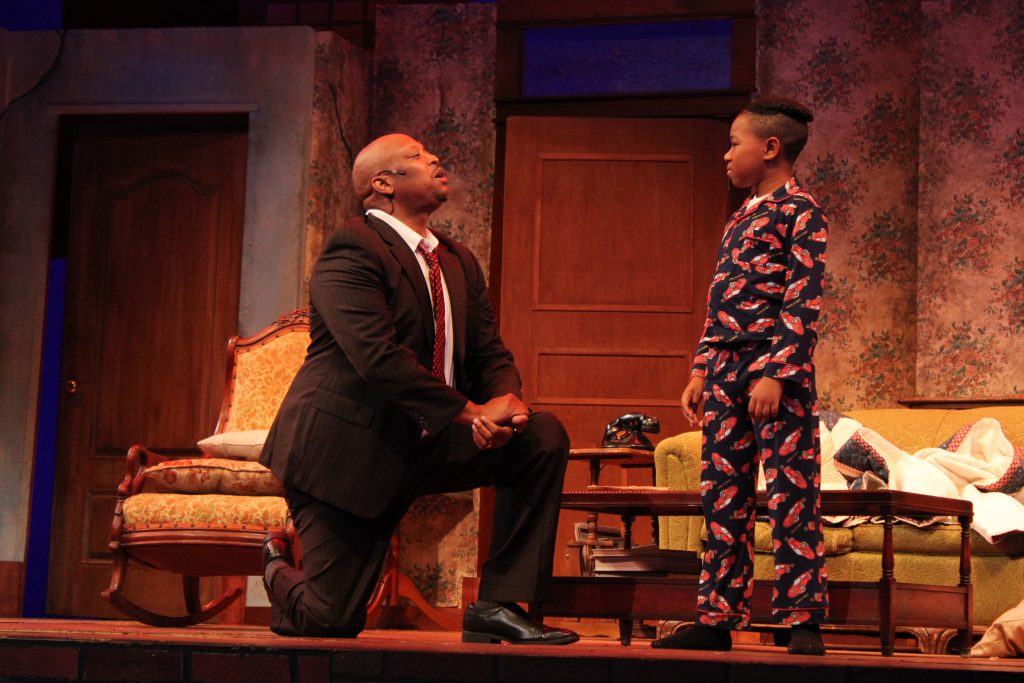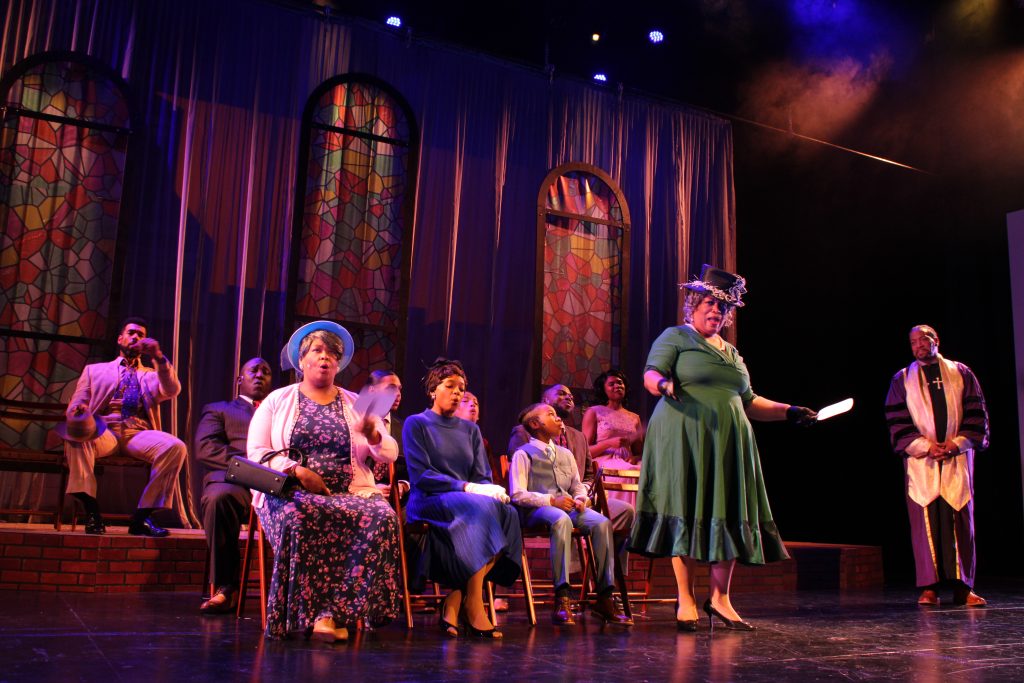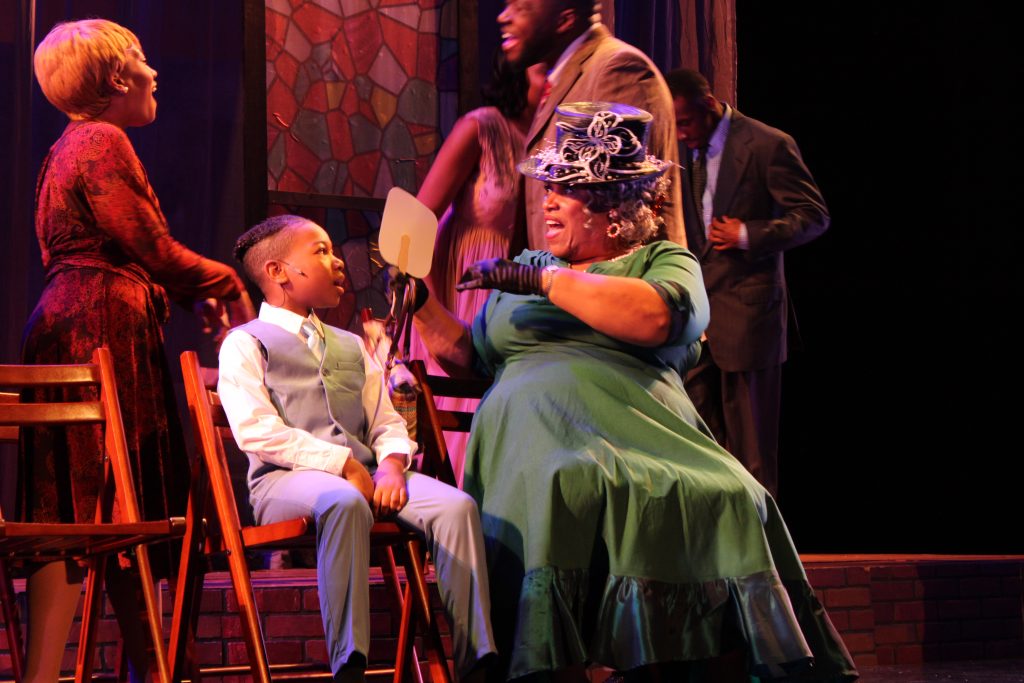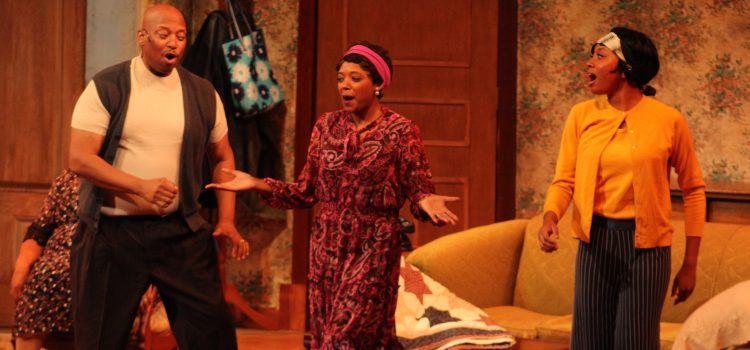By Lynn Venhaus
What happens to a dream deferred?
Does it dry up
like a raisin in the sun?
Or fester like a sore—
And then run?
Does it stink like rotten meat?
Or crust and sugar over—
like a syrupy sweet?
Maybe it just sags
like a heavy load.
Or does it explode?
– “Harlem,” Langston Hughes, 1951
Where are we now, 74 years later? Timely and timeless, the musical “Raisin” is a vibrant exploration of the class, gender and racial divides that have become a dominant part of American life.
The Black Rep’s sensitive, thoughtful production pulses with its character-driven work that hopefully resonates and renews pleas for social justice in today’s divided times.
The iconic poem, “Harlem,” shared above, was an inspiration for playwright Lorraine Hansberry to explore deferred dreams and class divides in 1951 segregated Chicago in her groundbreaking drama, “A Raisin in the Sun.”

The matriarch is expecting a $10,000 life insurance check in the mail after her hard-working husband’s passing. She wants to move the family from the South Side to Clybourne Park, a nicer neighborhood, where she has put a down payment on a 3-bedroom, 2-bathroom house. She sees this home as a foundation to build everyone’s dreams on, a door to new opportunities.
Hansberry was the first black female playwright on Broadway – the show debuted in 1959, and it was a new look at black life in America in a way that had not been represented. Think of the dialogues it may have started!
While the musical has hiccups based on its construction, not the singing, dancing or acting, the Black Rep’s stylistic choices and casting decisions are highlights.
The Younger family leaves an indelible impression in the hands of Anita Michelle Jackson (Mama Lena), Duane Martin Foster, (her son Walter Lee), Adrianna Jones (his wife Ruth), their young son Travis (Jaron Bentley), and Walter’s sister Beneatha (Andrea Mouton).

The 1973 musical adaptation, “Raisin,” won the Tony Award for Best Musical in 1974, as well as Virginia Capers winning Best Actress in a Musical for playing Mama Lena, out of nine nominations. It also won the Grammy Award for best musical theater album.
But it has largely been forgotten over time. Landmark musicals of that era – “Purlie” in 1970, “The Wiz” in 1975 and “Dreamgirls” in 1981, signaling a new wave of creative artists, have been produced many times.
The book was co-written by the late Hansberry’s husband, Robert Nemiroff, and Charlotte Zaltzberg. The themes are the same — a family dares to dream of a better life that has been denied them and threatens to fall apart.
The music score by composer Judd Woldin, with lyrics by Robert Brittan, is an intimate story of a family, their daily and big-picture struggles, and real ongoing conversations. That was rare then and remains an unusual approach now.
This musical is an ambitious undertaking, and while the story is absorbing, faithful to Hansberry’s intentions, this isn’t a splashy, bombastic score with extravagant numbers. Still, there is much heart and soul to be discovered.

Emphasizing authenticity and empathy, director Ron Himes depicts the Youngers’ struggles with the help of the creative stage work from sound designer Kareem Deanes and lighting designer Tony Anselmo.
The setting is their cramped, roach-infested apartment, effectively visually realized by scenic designer Tim Jones. But it opens beyond those walls – to a church, bar and streetscape. Mikhail Lynn contributed as a props designer, too.
The exceptional orchestra, led by music director Jermaine Manor, robustly brings out the jazz, gospel, blues and soul. William Von Hombract is on bass, James Belk on percussion, Des Jones on drums, Mary Weber and Brady Lewis on trumpet, Stan Coleman on reed, Monet Royal and Adrian Walker on viola, David Glenn on guitar, and Manor on keyboard.
Choreographer Kirven Douthit-Boyd’s inspired dance work adds so much to the street life, with expressive moves to the musical beats of the city. Dancers Jorrell Lawyer-Jefferson, Demetrius Malik Lee and Aaliyah Weston are extraordinary in their pieces and group numbers.

The gritty, bustling “Streets of Chicago” and “Runnin’ to Meet the Man” are livelier company numbers because of the choreography, and so is “Booze,” traditional “African Dance” and the ebullient spiritual gospel song “He Come Down This Morning.”
Walter Lee is a chauffeur but wants to open a liquor store and go into business with two other friends. Walter’s restlessness and growing resentments cause more fights between him and his wife and mother, mostly about the money. Mama Lena also wants to put money aside for Beneatha’s studies because she’s attending medical school.
Accomplished, acclaimed singers Jackson and Foster are the epitome of powerhouse vocalists, but to see them slip into the roles of Lena and Walter Lee with all their well-honed skills is to marvel at how natural their acting abilities are as well.
Jackson, who has a song full of hope as the prayerful Lena – “A Whole Lotta Sunlight,” and then a power ballad about resilience “Measure the Valleys” that’s a showstopper.

Foster’s sarcastic, bitter “Man Say” with his wife Ruth sets his tone, tired of playing by the rules while his aspirations are dismissed. while he seethes with rage in “You Done Right.”
In a tender moment, Foster and Jones pair on a lovely duet “Sweet Time,” while Jones shines in “Whose Angry Little Man,” a tribute to their son Travis.
In the second act, Foster shows a wider range of emotions, from an ebullient “It’s a Deal” to his anger that can’t be contained in the satirical “Not Anymore,” after a lifetime of disappointment and the bigotry they’ve endured, with his wife and sister participating, too.
The hopeful solo “Sidewalk Tree” is a special moment for the poised and talented Jaron Bentley, who delivers a dynamic performance as young Travis. He stood out at the Muny this summer in “Frozen” and “Evita” as part of the youth ensembles, and he has a bright future ahead with his remarkable stage presence.
A superb Robert McNichols is potent as Nigerian student Asagai, who is a friend seeing Beneatha. His charm shines through in the number “Alaiyo.” Beneatha’s exploration of her cultural awakening is another highlight, as illustrated in her fashion choices – fine work from costume designer Gregory Horton.

Supporting roles also include Will Bonfiglio as weaselly Karl Lindner, not exactly a Welcome Wagon for Clybourne Park., and De-Rance Blaylock as neighbor Mrs. Johnson, who literally takes us to church in the spirited number “He Come Down This Morning.”
The ensemble also includes Dwayne Moss III as Willie Harris, Adrian Rice as Bobo, Damari Padilla and Tia Renee Williams.
The ensemble moves well, their passion obvious.
The hope is that spotlighting this work will introduce a new generation to the play or at least remind others of work that still needs to be done.
The Black Rep presents “Raisin” as their 49th season opener from Sept. 3 through Sunday, Sept. 21 at the Edison Theater on the campus of Washington University in St. Louis. For more information: www.theblackrep.org.

Lynn (Zipfel) Venhaus has had a continuous byline in St. Louis metro region publications since 1978. She writes features and news for Belleville News-Democrat and contributes to St. Louis magazine and other publications.
She is a Rotten Tomatoes-approved film critic, currently reviews films for Webster-Kirkwood Times and KTRS Radio, covers entertainment for PopLifeSTL.com and co-hosts podcast PopLifeSTL.com…Presents.
She is a member of Critics Choice Association, where she serves on the women’s and marketing committees; Alliance of Women Film Journalists; and on the board of the St. Louis Film Critics Association. She is a founding and board member of the St. Louis Theater Circle.
She is retired from teaching journalism/media as an adjunct college instructor.






